calsfoundation@cals.org
"Dizzy" Dean (1910–1974)
aka: Jay Hanna Dean
Jay Hanna “Dizzy” Dean was a professional baseball player and radio and television baseball broadcaster who was later inducted into the National Baseball Hall of Fame and the Arkansas Sports Hall of Fame. Dean and his younger brother, Paul, pitched for the St. Louis Cardinals during the team’s “Gashouse Gang” era of the 1930s. Along with the aging Babe Ruth, “Dizzy” Dean was considered baseball’s major drawing card during the Depression years of the 1930s.
Born in Lucas (Logan County) on January 16, 1910, Jay Dean was the son of Albert Monroe “Ab” Dean, a tenant farmer and sawmill worker, and Alma Nelson Dean. His Arkansas childhood was not an easy one. His mother died in 1918 from tuberculosis, and parental guidance from his father was scarce because he worked long hours. The family moved to Yell County in 1920 and later to Oklahoma, first to Purcell in 1924 and then to the Okemah and Spaulding area in 1926. Dean’s school attendance became sporadic following his mother’s death, ceasing totally in 1926 when he joined the Army at age sixteen. In later years, Dean would claim a fourth-grade education. Growing up, he demonstrated more skill at picking cotton than at being a scholar, though throwing a baseball would prove to be his real talent.
Named for Jay Gould, the nineteenth-century railroad magnate, and Mark Hanna, an Ohio political figure of the same era, Dean confused sportswriters by going, at times, by “Jerome Herman,” the name of a former Lucas playmate who had died when Dean was seven. He added further confusion shortly after arriving in the major leagues by telling three reporters (in a matter of hours) three different locations and dates of his birth. Dean later explained, “I was helping the writers out…. Them ain’t lies, them’s scoops.”
There is also some debate as to how Dean acquired the nickname “Dizzy,” though the generally accepted explanation is that it resulted from a 1927 incident during Dean’s military career when an Army sergeant found young Dean throwing peeled potatoes against garbage can lids and erupted with an exclamatory, “You dizzy son-of-a-bitch!” Dean left the Army in 1929, signing with a semi-pro team in San Antonio. In 1930, he signed a baseball contract with the Houston minor-league team, which sent Dean to St. Joseph, Missouri, to pitch. Dean joined the Houston club for the 1930 and 1931 seasons and was in the big leagues for the 1932 season when the St. Louis Cardinals purchased his contract. Dean married Patricia Nash on June 15, 1931, and she proved to be a shrewd business manager for her husband’s interests throughout his life. They had no children.
The 1933 season saw the colorful Dean emerge as a star for the St. Louis club. He won twenty games that season and set what was a record for strikeouts at the time when he fanned seventeen batters in a nine-inning game.
The 1934 season would be Dean’s greatest and one of the memorable performances by any pitcher in history. His brother Paul joined the St. Louis pitching staff for the 1934 season, and though Paul had never pitched in the major leagues, Dean promised reporters before the season began that “me ’n Paul” would win forty-five games. For once, Dean underestimated himself, as he won thirty games (making Dean the last National League pitcher to win thirty in a season), while Paul won nineteen, for a Dean family total of forty-nine wins. Dean’s 30–7 record gained him the National League’s most valuable player award, and he was voted by the fans to the 1934 all-star game.
The 1934 World Series was the first national radio broadcast of the October classic, and the Deans made the most of the national spotlight, winning two games each as the Cardinals won the series.
Dean’s playing career essentially came to an end almost three years later. He had won twelve games by the all-star break of the 1937 season and was the starting pitcher for the National Leaguers in that exhibition game. The last batter Dean was to face, Earl Averill, hit a line drive that struck Dean’s big toe on his left foot. Dean left the field seemingly unhurt, but his toe had been broken. Only ten days later, however, he was back on the mound pitching. Due to the pain, he could not throw normally, but he continued to attempt to pitch as frequently as he had in the past. An arm injury resulted and effectively ended at its peak one of the brightest pitching careers of the 1930s. For the remainder of the 1937 season, Dean won only one game as he rested his arm for extended weeks and refrained from pitching in an attempt to regain his fastball.
The Cardinals sensed that Dean might be seriously injured, so they agreed to a trade in the off-season, sending Dean to the Chicago Cubs, but not before reaching an understanding with Cubs’ management that Dean might be seriously hurt. Lightly used over the next three years because of his arm problems, Dean managed to win only sixteen games for the Chicago club, using a combination of off-speed pitches, slow curves, and his “nothing” ball. He retired early in the 1941 season.
Dizzy Dean found new employment by moving his talking from the baseball field to the broadcast booth. A St. Louis radio station that broadcast the home games of the Cardinals and the American League’s St. Louis Browns provided the opportunity. Dean was part of the first generation of former players to use their first-hand knowledge of the game to become a baseball broadcaster, and Dean was the first announcer to make humor a regular part of his broadcast. He saw no need to report statistics to listeners, and he didn’t keep a scorecard of the game’s progress. A Dean radio broadcast (or a television broadcast, after Dean moved to that medium with the first national broadcast of The Game of the Week in 1953) featured baseball slang, the vocabulary of rural America, Dean’s own word inventions, and his mispronunciations of players’ names. “I’m just gonna speak plain ol’ ordinary pinto bean English,” Dean told baseball fans.
A new baseball language emerged from the Dean broadcasts. Runners “slud” into bases, players “throwed” the ball, a batter strode to the plate “confidentiality” and looked “mighty hitterish” in the batter’s box. If a batter “swang” at the pitch mightily, he “had quite a ripple” at the ball. If runners were on base and a foul ball was hit, the runners had to return to their “respectable” bases. Listeners could generally count on a Dean rendition of “The Wabash Cannonball” and a few baseball stories from Dean’s playing career.
As Dean’s popularity as a broadcaster grew, some teachers expressed concern regarding Dean’s misuse of the language, but he withstood all challenges because of his great popularity with the fans. “I ain’t never met anybody that didn’t know what ain’t means” was Dean’s assessment.
Dean was elected to the National Baseball Hall of Fame in 1953, and he was inducted into the Arkansas Sports Hall of Fame posthumously in 1983.
Dean died July 17, 1974, in Reno, Nevada, following a heart attack. He is buried in Bond, Mississippi, his wife Pat’s hometown, where the Deans made their home.
For additional information:
Alexander, Charles C. Breaking the Slump: Baseball in the Depression Era. New York. New York: Columbia University Press, 2002.
Dixon, Phil S. The Dizzy and Daffy Dean Barnstorming Tour: Race, Media, and America’s National Pastime. Lanham, MD: Rowman & Littlefield, 2019.
Gregory, Robert. Diz: The Story of Dizzy Dean and Baseball During the Great Depression. New York: Viking, 1992.
Huber, Patrick and David Anderson. “‘Butcherin’ Up the English Language a Little Bit’: Dizzy Dean, Baseball Broadcasting, and the ‘School Marms’ Uprising of 1946.” Missouri Historical Review 96 (April 2002): 211–231.
National Baseball Hall of Fame and Museum. https://baseballhall.org/ (accessed July 6, 2023).
Smith, Curt. America’s Dizzy Dean. St. Louis, MO: Bethany Press, 1978.
Staten, Vince. Ol’ Diz. New York: Harper Collins, 1992.
Tye, Larry. “Satchel & Dizzy: Depression Era Duel.” American History 45 (June 2010): 34–39.
Bob Razer
Central Arkansas Library System
 Early Twentieth Century, 1901 through 1940
Early Twentieth Century, 1901 through 1940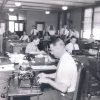 Mass Media
Mass Media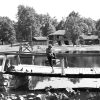 Recreation and Sports
Recreation and Sports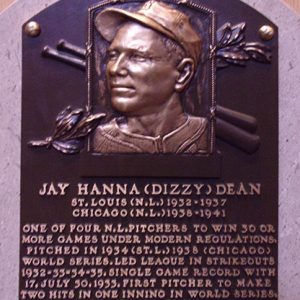 "Dizzy" Dean Plaque
"Dizzy" Dean Plaque 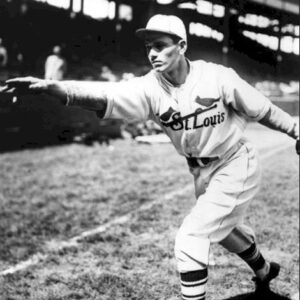 "Dizzy" Dean
"Dizzy" Dean 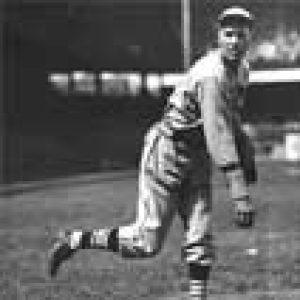 "Wabash Cannonball," Performed by "Dizzy" Dean
"Wabash Cannonball," Performed by "Dizzy" Dean 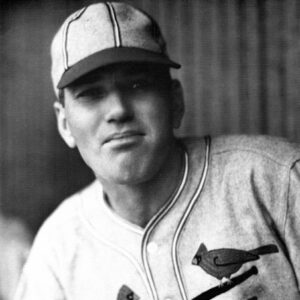 "Dizzy" Dean
"Dizzy" Dean 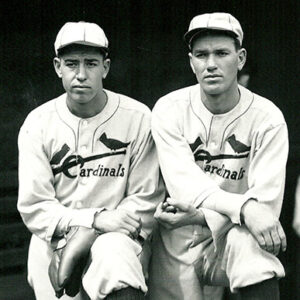 Dean Brothers
Dean Brothers 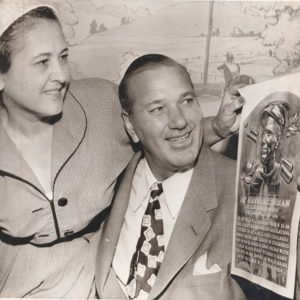 Deans
Deans 




Comments
No comments on this entry yet.